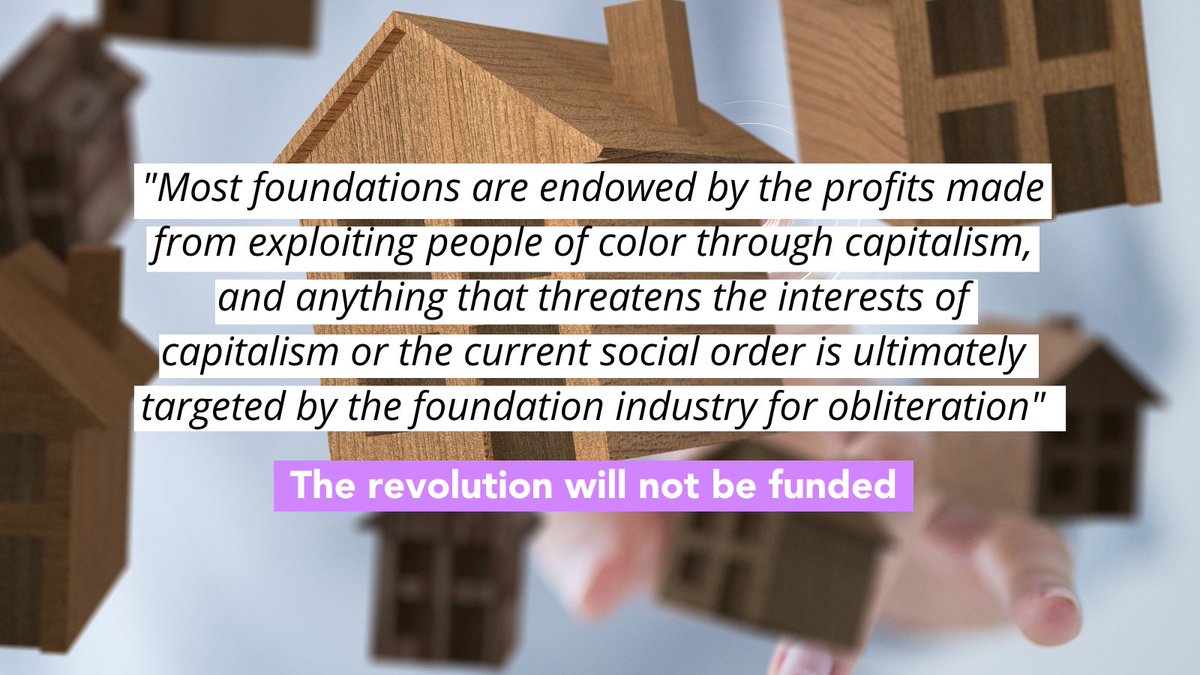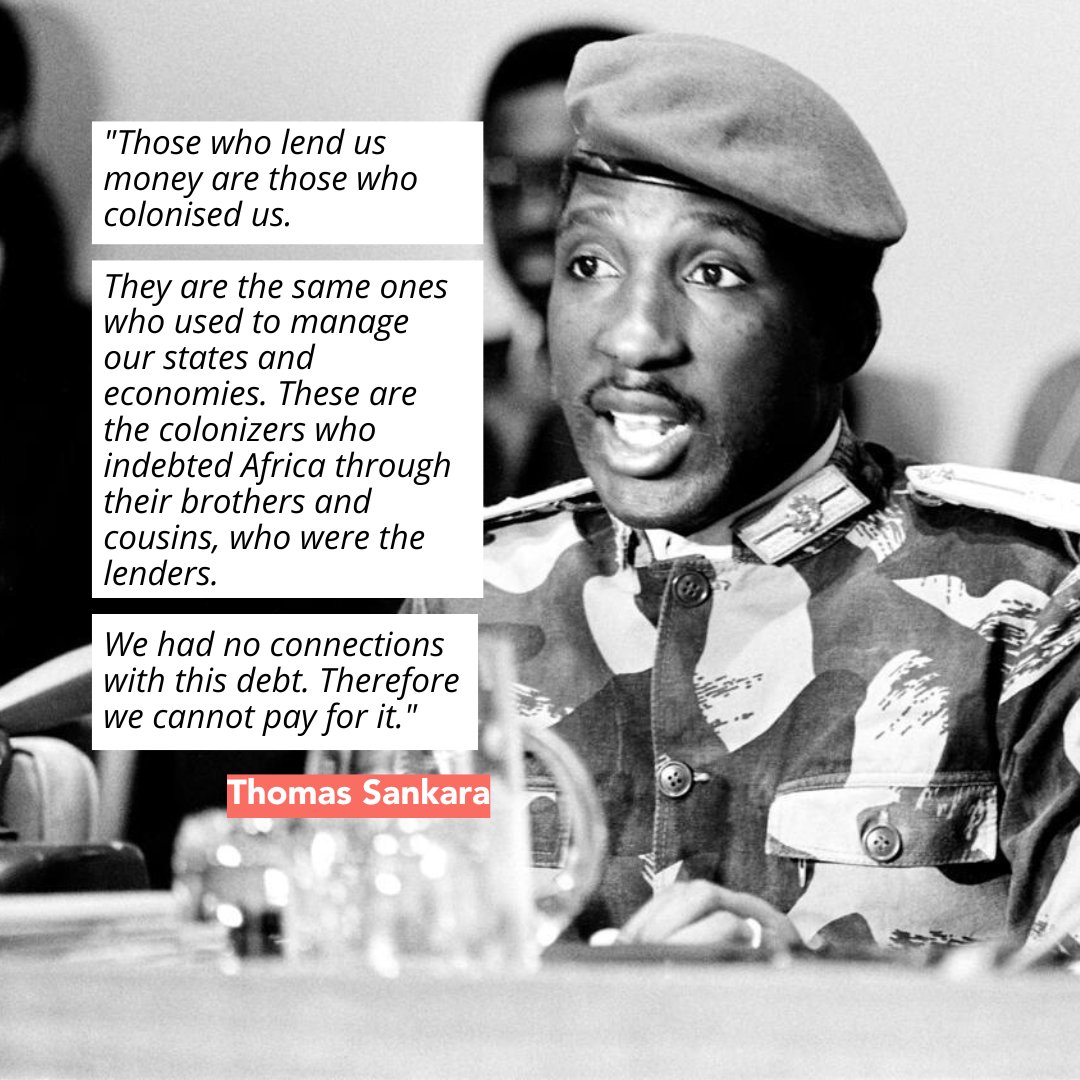"NGOs have tamed a generation of activists.
They’ve given up grand visions of social change & mass recruitment in favor of writing grants & wooing foundations; ceded control of the movement to executives in boardrooms..." @incitenews
What is the "NGO-isation" of resistance?
They’ve given up grand visions of social change & mass recruitment in favor of writing grants & wooing foundations; ceded control of the movement to executives in boardrooms..." @incitenews
What is the "NGO-isation" of resistance?

NGO-isation is the professionalisation, bureaucratisation, and institutionalisation of services that used to be fulfilled by governments or organised by mass movements.
The NGO-isation boom began in the late 1970s with the rise of neoliberal policies.
Countries began to privatise essential public goods and services like energy, housing, healthcare and education.
Countries began to privatise essential public goods and services like energy, housing, healthcare and education.
As these essential public goods and services were sold off and their price set by the market, inequality rose.
As the state was increasingly privitised, private philanthropy and NGO’s moved into this area of work.
As the state was increasingly privitised, private philanthropy and NGO’s moved into this area of work.
The problem with private philanthropy and NGO’s stepping into social services previously done by governments or advocated by communities is that they tend to be materially incapable of tackling these issues for the long term.
Many NGO’s that provide advocacy do not have the people power to put enough pressure on decision-makers when competing with cashed-up corporate lobbies.
NGOs that provide a service operate with funds that are a fraction of public spending.
Relying on public or private grants means many NGOs must compete with others for resources.
This creates in-fighting and a hierarchy of issues, rather than solidarity.
Relying on public or private grants means many NGOs must compete with others for resources.
This creates in-fighting and a hierarchy of issues, rather than solidarity.
Many also critique NGOs as being more accountable to their funders first and not to the people they work for or among.
NGO’s must often create projects that meet the interests of what private foundations want to fund, which is often incompatible with real community needs.
NGO’s must often create projects that meet the interests of what private foundations want to fund, which is often incompatible with real community needs.
Private foundations also opts to give through NGO’s because it does nothing to redistribute ownership of wealth or change the system that benefit corporations.
theguardian.com/society/2020/s…
theguardian.com/society/2020/s…
For example: instead of giving houses to people who are houseless, something that will make an immediate long-term difference, philanthropists fund NGOs to rent spaces (some that they might actually own!) and hire staff to provide short-term housing.
theguardian.com/housing-networ…
theguardian.com/housing-networ…
Not to mention that most of these private foundations made their super-profits from exploiting racialised people and paying them a fraction in wages. 

Arundhati Roy argues that NGOs defuse political anger and depoliticise resistance.
In the drive for more funds, many NGOs frame essential aid and services that people ought to have by right, as “charity”. By doing so, many NGO’s act “apolitically”. pambazuka.org/governance/ngo…
In the drive for more funds, many NGOs frame essential aid and services that people ought to have by right, as “charity”. By doing so, many NGO’s act “apolitically”. pambazuka.org/governance/ngo…
But it’s important to understand that “apolitical” is actually extremely political.
It endorses the current system, that sees housing, education, welfare, justice, care, food, water as a commodity one must be able to afford rather than a right.
It endorses the current system, that sees housing, education, welfare, justice, care, food, water as a commodity one must be able to afford rather than a right.
Of course, it is important to acknowledge that NGOs operate in many contexts and roles.
It is impossible to generalise about them.
Many do good & important work.
It is impossible to generalise about them.
Many do good & important work.
But it’s important to understand how the phenomena of "apolitical" NGOs arise within a system that shrinks democratic and public services.
It’s an outcome of a system that prioritises the profit and the interests of corporations over the essential needs of everyday people.
It’s an outcome of a system that prioritises the profit and the interests of corporations over the essential needs of everyday people.
Some argue that NGOs provide the only spaces in right-wing-dominated times to do meaningful work.
Eric Tang calls this a "take the money and run" attitude. But Tang also asks if that's the case "Where are we running to? What's the purpose?"
libcom.org/article/revolu…
Eric Tang calls this a "take the money and run" attitude. But Tang also asks if that's the case "Where are we running to? What's the purpose?"
libcom.org/article/revolu…
Tang argues that the ultimate purpose of an NGO should be to work itself out of existence.
Moving beyond NGOisation means building structures complementary and accountable to social movements.
Moving beyond NGOisation means building structures complementary and accountable to social movements.
It means taking a political stance, like pushing for public and democratic ownership of basic needs from housing, food to energy.
It means looking past centralised and corporate models and towards decision making across workers, neighbourhoods and communities.
It means looking past centralised and corporate models and towards decision making across workers, neighbourhoods and communities.
We can see alternatives to NGOs rising.
For example, tenant unions are forming to fight back against housing being used as a way to profit instead of home people newframe.com/halting-evicti…
For example, tenant unions are forming to fight back against housing being used as a way to profit instead of home people newframe.com/halting-evicti…
Worker organising has also been on the rise, with mass strikes of workers across France that have the power to stop production.
france24.com/en/france/2023…
france24.com/en/france/2023…
Students are striking, through Fridays for Future and building allies across other movements like in Germany.
etuc.org/en/german-unio…
etuc.org/en/german-unio…
Finland has a "housing first" model offers permanent housing and needs-based support for homeless people instead of temporary accommodation.
The Y-foundation builds affordable not-for-profit housing in partnership with municipals. theguardian.com/cities/2019/ju…
The Y-foundation builds affordable not-for-profit housing in partnership with municipals. theguardian.com/cities/2019/ju…
• • •
Missing some Tweet in this thread? You can try to
force a refresh

 Read on Twitter
Read on Twitter









